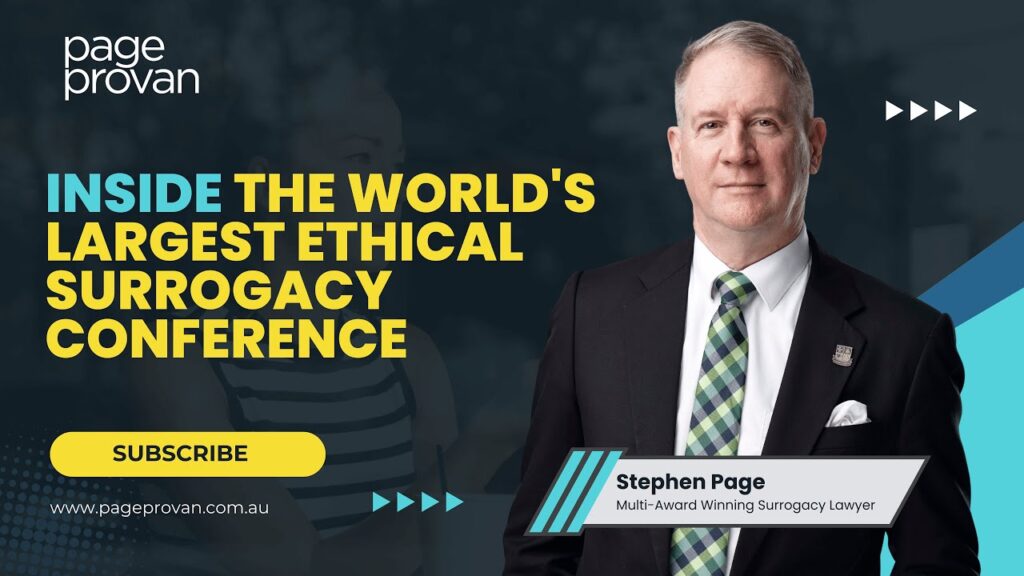Surrogacy Nightmare: Aussie Couple Referred for Criminal Charges After Overseas Baby Journey
Surrogacy can be a beautiful path to parenthood, but it also comes with intricate legal challenges, especially when undertaken overseas. In a recent and cautionary case from Queensland, Australia, a couple’s journey to parenthood through commercial surrogacy in North Cyprus ended not with joy alone, but with legal turmoil and potential criminal charges. This video unpacks the complexities of the Lloyd and Compton case, highlighting critical lessons for anyone considering surrogacy abroad.
Drawing on decades of experience advising over 2,000 surrogacy journeys worldwide, Stephen Page from Page Provan Family and Fertility Lawyers sheds light on the pitfalls of overseas commercial surrogacy and the importance of expert legal guidance.
The Lloyd and Compton Case: A Surrogacy Journey Gone Wrong
The case of Lloyd and Compton, decided by the Federal Circuit and Family Court of Australia in January, involved a Queensland couple who sought surrogacy services in North Cyprus. Unlike many surrogacy destinations, North Cyprus presents unique legal challenges, including the fact that its Turkish Republic status is not internationally recognized outside Turkey. This geopolitical nuance played a significant role in the legal complications that followed.
The couple enlisted the help of a surrogacy agency—not based in North Cyprus—to facilitate their journey. After the birth of their child, they encountered an unexpected hurdle: the birth certificate issued under North Cyprus law named the intended father and the surrogate mother as the legal parents, but critically, the intended mother was not listed as a parent.
This omission created a legal barrier for the intended mother to be recognized as a parent in Australia, sparking a series of legal actions that ultimately failed and led to serious repercussions.
Why the Intended Mother Was Not Recognized as a Parent
Under North Cyprus law, the surrogate mother is listed as the birth mother, and the intended father is the biological father. However, the law does not recognize the intended mother’s parental status at birth. This contrasts sharply with Australian family law standards, where intended parents typically seek to have both recognized legally.
The usual remedy in Australia in such situations is a stepparent adoption, which allows the intended mother to be legally recognized as the child’s parent. However, Queensland’s Adoption Act stipulates that a stepparent adoption cannot proceed until the child is at least five years old, complicating the timeline for the couple.
The Legal Maze: Stepparent Adoption and Leave to Adopt
Even if the couple had waited until the child was eligible for stepparent adoption, they would have needed to obtain leave to adopt from the Federal Circuit and Family Court of Australia before proceeding. This requirement exists as an anti-avoidance measure under the Family Law Act, designed to prevent legal loopholes that could undermine parental rights.
Interestingly, this legal divide arises because adoption is governed by state and territory laws, whereas divorce and custody fall under federal jurisdiction. This split has historically led to complex scenarios, especially when it comes to surrogacy and adoption across jurisdictions.
There is an exception: if the intended parents have a legally recognized parenting plan granting them parental responsibility, leave to adopt may not be necessary. Unfortunately for the couple, no such plan was in place.
Application to the Federal Circuit and Family Court: What Went Wrong?
The couple, through their New South Wales lawyer, applied to the Federal Circuit and Family Court seeking various orders, primarily to obtain leave to adopt. However, the court, presided over by Justice Karu in Brisbane, rejected all applications.
The judge’s decision was influenced heavily by the couple’s admission of having engaged in commercial surrogacy overseas, an act that is illegal under Queensland law and in several other Australian jurisdictions. This admission triggered serious concerns about the legality and ethics of the surrogacy arrangement.
Legal Consequences of Overseas Commercial Surrogacy for Australians
Engaging in commercial surrogacy overseas is an offence for residents of Queensland, New South Wales, and the Australian Capital Territory. Other states and territories, such as the Northern Territory, South Australia, and Western Australia, have similar laws that can apply under certain conditions.
Additionally, if an adoption overseas involves payment, it may also constitute an offence under Australian adoption laws. These laws are designed to protect children from exploitation and to maintain the integrity of family law processes.
In this case, the couple’s admission to commercial surrogacy overseas placed them at risk of prosecution, a situation rarely seen in Australian courts but one that the judge took seriously.
Referral for Prosecution and Lawyer Investigation
Justice Karu referred the couple to the Queensland Director of Public Prosecutions for consideration of criminal charges related to engaging in commercial surrogacy overseas. This referral is a rare and significant step, signalling the court’s disapproval of the couple’s actions.
Moreover, the lawyer representing the couple did not escape scrutiny. The judge referred the lawyer to the Legal Services Commission of New South Wales, citing concerns about the lawyer’s competence and ethics. Specifically, the lawyer filed an affidavit that evidenced the commission of an offence and made legal assertions about North Cyprus law without proper expertise or clear documentation.
The court criticized the lawyer for failing to provide sufficient evidence and for misrepresenting foreign law, underscoring the importance of using qualified legal counsel with appropriate knowledge of both domestic and international surrogacy laws.
Why Expert Legal Advice Is Crucial Before Overseas Surrogacy
This case starkly illustrates the dangers of navigating overseas surrogacy without expert legal guidance. Surrogacy laws are complex and vary widely between jurisdictions, with some countries having no legal framework, others imposing strict prohibitions, and many having conflicting rules.
Stephen Page, who has provided legal advice on over 2,000 surrogacy journeys across 39 countries since 1988, emphasizes that prospective parents must seek comprehensive, expert legal advice before embarking on surrogacy abroad. Doing so can prevent legal pitfalls, ensure compliance with Australian law, and protect the best interests of the child.
Good legal advice includes understanding:
- The laws of the country where surrogacy will take place
- How Australian law applies to overseas surrogacy arrangements
- The requirements to establish parental rights in Australia after the child’s birth
- The potential criminal implications of commercial surrogacy
- The process and timing for adoption or parentage orders in Australian courts
The Silver Lining: Why Prosecution Is Unlikely in This Case
While the couple’s situation is serious, the judgment contains a glimmer of hope. Prosecution is unlikely, primarily due to the statute of limitations in Queensland, which limits prosecution for this offence to within one year of the offence occurring.
Since the surrogacy arrangement was entered into in 2023 and the judgment was delivered in January 2025, the time limit for prosecution had expired by the time the court considered the case.
Historically, no one has been prosecuted for engaging in overseas commercial surrogacy since these laws came into effect around 2010, despite their stringent nature.
Key Takeaways for Prospective Parents Considering Overseas Surrogacy
The Lloyd and Compton case serves as a stark warning and a learning opportunity for anyone contemplating overseas surrogacy. Here are the essential takeaways:
- Understand the Law: Laws regarding surrogacy and adoption vary drastically between countries and Australian states. Know the legal implications in both jurisdictions.
- Seek Expert Legal Advice: Engage lawyers with extensive experience in family and fertility law to navigate the process legally and smoothly.
- Avoid Commercial Surrogacy: Commercial surrogacy is illegal for Australian residents in many jurisdictions and can lead to criminal charges.
- Prepare for Parentage Recognition: Ensure you understand how to secure legal parentage in Australia post-birth, including the need for adoption or parentage orders.
- Don’t Risk Unsanctioned Legal Steps: Avoid shortcuts or unverified legal advice that could jeopardize your parental rights or lead to prosecution.
Conclusion
Surrogacy is a deeply personal and often complex journey toward building a family. However, as the Lloyd and Compton case shows, the legal landscape surrounding overseas commercial surrogacy is fraught with risks that can lead to heartbreak and legal jeopardy.
For Australian couples considering surrogacy abroad, the message is clear: do your homework, comply with the law, and seek expert legal counsel every step of the way. With over three decades of experience guiding families through these challenges, trusted legal advice is your best safeguard against the pitfalls of international surrogacy.
Remember, becoming parents should be a joyous chapter, not a legal nightmare. Protect your family’s future by making informed, lawful decisions.












